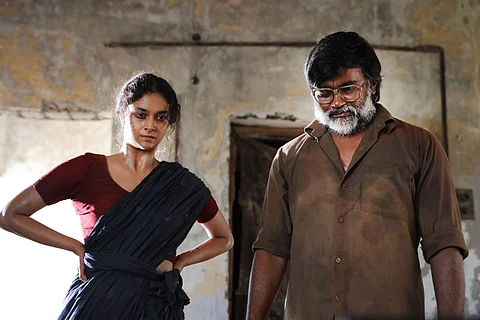

The second installment of director Arun Matheswaran’s revenge trilogy is here and it is a conflicting watch. Following his debut film, Rocky, that won widespread acclaim, Saani Kaayidham premiered directly on Amazon Prime Video on May 6. The story centres around a police constable, Ponni (Keerthy Suresh), and Sangayya (Selvaraghavan), a gas cylinder delivery man.
A brusquely-spoken woman, Ponni, lives within meagre means and is entirely absorbed with her job, husband and daughter. Until a series of terrible events, including her rape, set her on a different path. Joining her on this path, is Sangayya, also a victim of the same people who ruin Ponni’s life. The gang-rape of Ponni plays out for an excruciatingly protracted time, slowly, brutally.
Sexual assault and casteism are issues that shouldn’t be easy fodder for revenge drama films. It’s a cinematic choice for which sensitivity is discarded entirely. How else to make the vengeance that will come later feel all the more satisfying and righteous to the viewer, the director seems to think. Filmmakers need to stop, just simply stop using sexual violence as a cinematic prop. Normally, in Tamil films, a woman’s life is “over” after she has been sexually assaulted. Saani Khaayidham tries to deviate from that, but ends up reinforcing another trope - that a woman, who is otherwise primarily the wife, daughter, or mother, needs to go through something as traumatic as a sexual assault to become “stronger”. Why must a woman’s world grow outside the domestic, beyond family, only after she has been raped? Why is it necessary to have long-drawn out sequences of sexual assault, particularly made by someone far less likely to even be able imagine what it is like to have your gender weaponsised against you?
The film also attempts some virtue signalling with throwaway sentences like “There’s no place for your self-respect here” by one of the antagonists to Ponni’s husband, Maari (Kanna Ravi), a rice-mill worker. The reference is to Periyar’s anti-caste Suyamariaathai Movement. The set-up to convince us of the villainy of these men is peppered with hints like this and to point to Maari’s caste-location. But this isn’t an anti-caste film. It isn’t a remotely political film. This is just a revenge drama, mixing in some vague allusions to casteism because it increasingly feels like Kollywood is trying to juice the marketability of social justice off the back of actual anti-caste filmmakers. The insistence on depicting the “jaathi-veri” of the perpetrators comes off as a flimsy attempt to raise the story above the done-to-death crime-revenge-crime plotlines.
What compels you to keep watching is Matheswaran’s framing, so starkly different from the chaotic riot of colours familiar to Kollywood. Like in Rocky, black and white scenes intercut into the film; each of them nearly poetic in their rendition. One such scene is a flashback of Ponni and Sangayya when they are children (they are also half-siblings). Sangayya stands curious and forlorn to the far left of the shot, Ponni walks away with her mother after being shooed off by Sangayya’s family. The two of them, despite being far nearer to the camera, look like miniature dolls. The sand dunes of the beach that the sequence is set in, loom large, bleached almost white by the sun beating down, and utterly apathetic.
Matheswaran also has a way of depicting violence amidst a disquieting stillness. The scenes have none of the over-the-top theatricality common to Kollywood to dial up the brutality playing out on screen. The various instances of assault — and there are many — have no thundering music or high-intensity action cuts. Every element surrounding the violent act is almost serene, as if to say the cruel acts of powerful people happen unchecked as the world carries on with its business, indifferent. But this is also where the worst aspects of the film lie. It revels in the torment of its characters; draws out their pain, their howls of agony, and the camera lingers with an almost vile hunger on their gruesome wounds.
Ultimately though, it is for the actors that Saani Khaayidham is truly worth sitting through. Keerthy Suresh is formidable as a woman fuelled by her rage and past trauma. Her performance in this role is one among a handful that reveal how vastly women actors are short-changed by Kollywood as little more than bubbly “loosu-ponnu” love interests for various male stars. We see Selvaraghavan, known widely for his film direction, in front of the camera again after his appearance in Vijay’s Beast. He brings a solid presence to the screen, managing to be the kindly uncle to Ponni’s daughter, Dhanna, and does justice to his role as the grief-stricken old man with not much to call his own and an unnervingly stoic murderer. The two actors are at their best in a story that unfortunately needs to deeply introspect on how it chooses to depict the brutalities of the real world.
Disclaimer: This review was not paid for or commissioned by anyone associated with the series/film. TNM Editorial is independent of any business relationship the organisation may have with producers or any other members of its cast or crew.